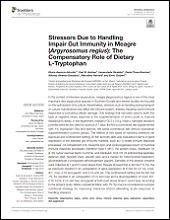Mostrar el registro sencillo del ítem
Stressors Due to Handling Impair Gut Immunity in Meagre (Argyrosomus regius): The Compensatory Role of Dietary L-Tryptophan
| dc.contributor.author | ASENCIO ALCUDIA, GLORIA GERTRUDYS | |
| dc.contributor.author | Andree, Karl | |
| dc.contributor.author | Díaz, Inmaculada Giráldez | |
| dc.contributor.author | Tovar Ramírez, Dariel | |
| dc.contributor.author | Álvarez González, Carlos Alfonso | |
| dc.contributor.author | Herrera, Marcelino | |
| dc.contributor.author | Gisbert, Enric | |
| dc.date.issued | 2019 | |
| dc.identifier | https://cibnor.repositorioinstitucional.mx/jspui/handle/1001/1627 | |
| dc.identifier.issn | 1664-042X | |
| dc.identifier.other | 10.3389/fphys.2019.00547 | |
| dc.identifier.uri | http://dspace.cibnor.mx:8080/handle/123456789/2963 | |
| dc.identifier.uri | URL: https://www.frontiersin.org/articles/10.3389/fphys.2019.00547/full | |
| dc.format | es | |
| dc.language.iso | eng | es |
| dc.publisher | Frontiers media, S. A. | es |
| dc.rights | Acceso abierto | es |
| dc.source | Frontiers in Physiology | |
| dc.subject | Argyrosomus regius, amino acid, stress, immune response, gene expression, aquaculture, diet supplement | es |
| dc.subject.classification | NUTRICIÓN | es |
| dc.title | Stressors Due to Handling Impair Gut Immunity in Meagre (Argyrosomus regius): The Compensatory Role of Dietary L-Tryptophan | es |
| dc.type | article | es |
| dc.description.abstracten | "In the context of intensive aquaculture, meagre (Argyrosomus regius) is one of the most important new aquaculture species in Southern Europe and several studies are focused on the optimization of its culture. Nevertheless, stressors such as handling during transport or culture maintenance may affect the immune system, thereby impairing some immune responses or provoking cellular damage. One strategy that has been used to avert this type of negative stress response is the supplementation of amino acids to improve resistance to stress. In this experiment, meagre (105.0 ± 2.6 g, mean ± standard deviation) juveniles were fed two diets for a period of 7 days, the first a commercial diet supplemented with 1% tryptophan (Trp) and second, the same commercial diet without tryptophan supplementation (control group). The effects of two types of handling stressors (air exposure and confinement/netting) on fish fed both diets was evaluated in terms of gene expression of the selected gut immunity markers, such as (1) innate immune response processes: c3 complement (c3), lysozyme (lys), and cyclooxygenase (cox2); (2) humoral immune response processes: interferon type 1 (ifn1), mx protein (mxp), interleukin 1b (il-1b), tumor necrosis factor 1a (tnf1a), and interleukin 10 (il-10); (3) antimicrobial peptides: defensin (def), hepcidin (hep), piscidin (pis), and a marker for mitochondrial respiration: glyceraldehyde 3-phosphate dehydrogenase (gapdh). Samples of the anterior intestine were collected at 1 and 6 h post-stress (hps). Results showed that in fish fed 1% Trp, the air exposure resulted in an upregulation of gene expression at 6 hps for c3, lys, cox2, ifn1, mxp, il-10 and gapdh, and il-1b and pis. The confinement/netting test for fish fed 1% Trp resulted in an upregulation of c3 and mxp and a downregulation of cox2, ifn1, il-1b, tnf1a, il-10, def, hep, and gapdh at both post-stress times (1 and 6 hps). According to the present study, dietary supplementation with 1% Trp may be considered as a proper nutritional strategy for improving tolerance and/or alleviating acute response to handling stressors." | es |

